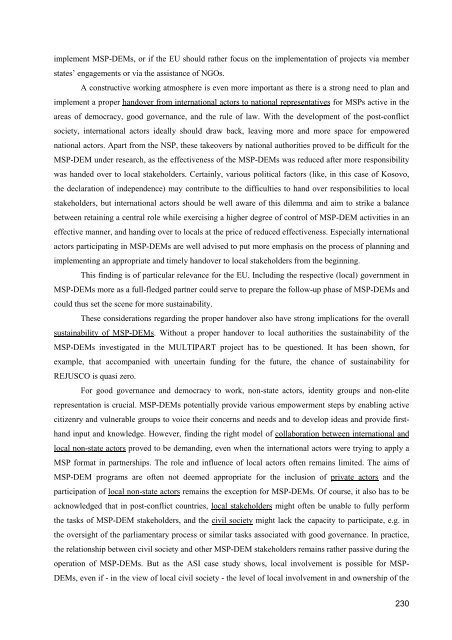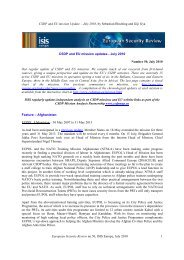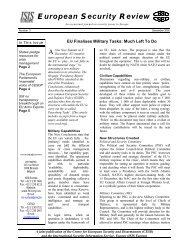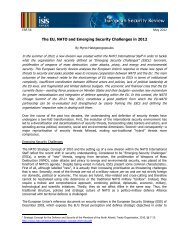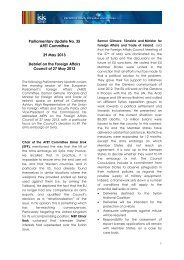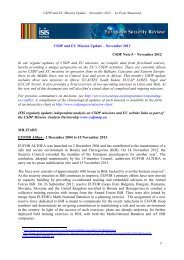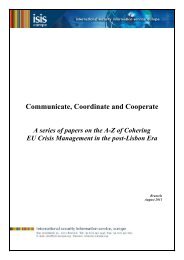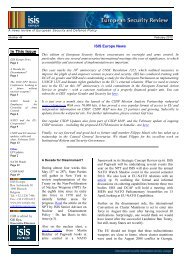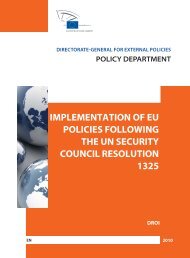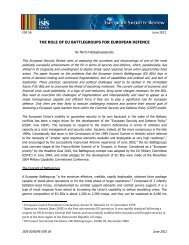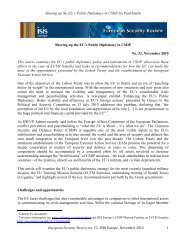Multipart thematic paper on multi-stakeholder ... - ISIS Europe
Multipart thematic paper on multi-stakeholder ... - ISIS Europe
Multipart thematic paper on multi-stakeholder ... - ISIS Europe
You also want an ePaper? Increase the reach of your titles
YUMPU automatically turns print PDFs into web optimized ePapers that Google loves.
implement MSP-DEMs, or if the EU should rather focus <strong>on</strong> the implementati<strong>on</strong> of projects via member<br />
states’ engagements or via the assistance of NGOs.<br />
A c<strong>on</strong>structive working atmosphere is even more important as there is a str<strong>on</strong>g need to plan and<br />
implement a proper handover from internati<strong>on</strong>al actors to nati<strong>on</strong>al representatives for MSPs active in the<br />
areas of democracy, good governance, and the rule of law. With the development of the post-c<strong>on</strong>flict<br />
society, internati<strong>on</strong>al actors ideally should draw back, leaving more and more space for empowered<br />
nati<strong>on</strong>al actors. Apart from the NSP, these takeovers by nati<strong>on</strong>al authorities proved to be difficult for the<br />
MSP-DEM under research, as the effectiveness of the MSP-DEMs was reduced after more resp<strong>on</strong>sibility<br />
was handed over to local <strong>stakeholder</strong>s. Certainly, various political factors (like, in this case of Kosovo,<br />
the declarati<strong>on</strong> of independence) may c<strong>on</strong>tribute to the difficulties to hand over resp<strong>on</strong>sibilities to local<br />
<strong>stakeholder</strong>s, but internati<strong>on</strong>al actors should be well aware of this dilemma and aim to strike a balance<br />
between retaining a central role while exercising a higher degree of c<strong>on</strong>trol of MSP-DEM activities in an<br />
effective manner, and handing over to locals at the price of reduced effectiveness. Especially internati<strong>on</strong>al<br />
actors participating in MSP-DEMs are well advised to put more emphasis <strong>on</strong> the process of planning and<br />
implementing an appropriate and timely handover to local <strong>stakeholder</strong>s from the beginning.<br />
This finding is of particular relevance for the EU. Including the respective (local) government in<br />
MSP-DEMs more as a full-fledged partner could serve to prepare the follow-up phase of MSP-DEMs and<br />
could thus set the scene for more sustainability.<br />
These c<strong>on</strong>siderati<strong>on</strong>s regarding the proper handover also have str<strong>on</strong>g implicati<strong>on</strong>s for the overall<br />
sustainability of MSP-DEMs. Without a proper handover to local authorities the sustainability of the<br />
MSP-DEMs investigated in the MULTIPART project has to be questi<strong>on</strong>ed. It has been shown, for<br />
example, that accompanied with uncertain funding for the future, the chance of sustainability for<br />
REJUSCO is quasi zero.<br />
For good governance and democracy to work, n<strong>on</strong>-state actors, identity groups and n<strong>on</strong>-elite<br />
representati<strong>on</strong> is crucial. MSP-DEMs potentially provide various empowerment steps by enabling active<br />
citizenry and vulnerable groups to voice their c<strong>on</strong>cerns and needs and to develop ideas and provide firsthand<br />
input and knowledge. However, finding the right model of collaborati<strong>on</strong> between internati<strong>on</strong>al and<br />
local n<strong>on</strong>-state actors proved to be demanding, even when the internati<strong>on</strong>al actors were trying to apply a<br />
MSP format in partnerships. The role and influence of local actors often remains limited. The aims of<br />
MSP-DEM programs are often not deemed appropriate for the inclusi<strong>on</strong> of private actors and the<br />
participati<strong>on</strong> of local n<strong>on</strong>-state actors remains the excepti<strong>on</strong> for MSP-DEMs. Of course, it also has to be<br />
acknowledged that in post-c<strong>on</strong>flict countries, local <strong>stakeholder</strong>s might often be unable to fully perform<br />
the tasks of MSP-DEM <strong>stakeholder</strong>s, and the civil society might lack the capacity to participate, e.g. in<br />
the oversight of the parliamentary process or similar tasks associated with good governance. In practice,<br />
the relati<strong>on</strong>ship between civil society and other MSP-DEM <strong>stakeholder</strong>s remains rather passive during the<br />
operati<strong>on</strong> of MSP-DEMs. But as the ASI case study shows, local involvement is possible for MSP-<br />
DEMs, even if - in the view of local civil society - the level of local involvement in and ownership of the<br />
230


